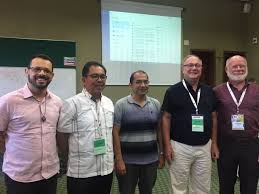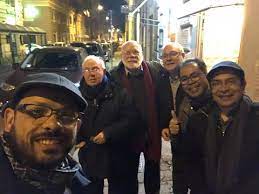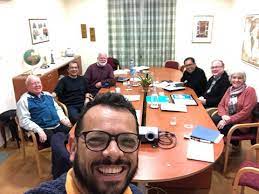MSC GENERAL ADMINISTRATION MEETINGS

This week sees the next phase of the General Conference, all by Zoom. Chris Chaplin, third counsellor, consigliere terzo, offers a reflection on the functioning of the General MSC Administration.
Thrust into international leadership three years ago, the General Leadership Team has had a very steep learning curve in its first three years. Apart from the massive task of five strangers coming together from the four corners of the earth to build a cohesive team, was the mystery of learning how administrations operate at the General level. Bumping up against the edges of congregational structures, we gradually discovered how the boundaries define an administration, and how open or closed they were to its influence.

Administrations are made up of people. Roles and responsibilities, functions and systems don’t actually exist separately to the individuals who shape them. So, one of the significant undertakings of the Leadership Team has been to work together with the permanent members of the General Administration to co-create a group who can relate well and function in service of the Society’s mission.
Our constitutions use the term “collaborators” for the members of the General Administration that include the Secretariat, Bursar, Postulator, Procurator, Archivist and since 2018 a permanent position for Safeguarding. In the last six months there have been some significant changes of collaborators. Benny Laisina has taken Hans Ngala’s position as Bursar, Robertus Sumarwata finished as Archivist, and Hengki Ponamon will begin archive training programs this year, while Polce Pitoy acts in that role for the present time. Richard Suresh has joined the Secretariat as an Assistant to the Administration. As collaborators, all these people co-labour for the whole Society, but one might be mistaken in thinking that they are here to labour for the other group – the General Council.

The vision of leadership that steers us is better imagined as a complete circle of equal parts having different functions. We have moved away from constitutional terminology such a collaborators and councils to a language which better describes the leadership paradigm out of which we aspire to work. We speak of the council as a leadership team and the collaborators as an administrative team, together forming the one General Administration.
Calling on the wisdom of the group we have developed some organisational strategies to strengthen both teams and the administration as a whole. We have begun to have quarterly meetings of individual offices with the leadership team. The initial purpose of these meetings is to develop a common understanding of the roles and responsibilities of each member of the Administration. These are also opportunities to hear specific issues and to affirm individuals in the gifts they bring to their ministries.
It has also been important to institute quarterly meetings of the whole administration so that everyone hears everyone, including those in an assistant role, one of whom is Ms. Sophia Amante, a laywoman whose exceptional contribution in our finance office and management of the domestic needs of the General House is gratefully acknowledged. Team leadership should encourage the voice of all the players no matter what their position. This builds ownership and trust. Equally everyone has the responsibility of listening in such a way that all feel heard. Indeed, empathic, and generative listening is at the heart of this vision of leadership. Everyone in the team is called to accept the leadership of their own role so that we develop a team of leaders who can together follow the common wisdom, rather than a leader with a team of followers following his wisdom.

The sound of joy in a team says something about the quality of the relationships that exist between them. We have discussed how our Administration gatherings should not be business only, but also social opportunities, times of prayerful deep listening in communal wisdom, retreats in common, and supported group work with external facilitators who can help develop cohesiveness and effectiveness. All of this contributes to a happy working environment, which motivates our willingness to give ourselves fully in service of the wider community of members in our entities.
I conclude with a word of gratitude to all the Administration for their willingness to embrace these processes so readily. Thank you.